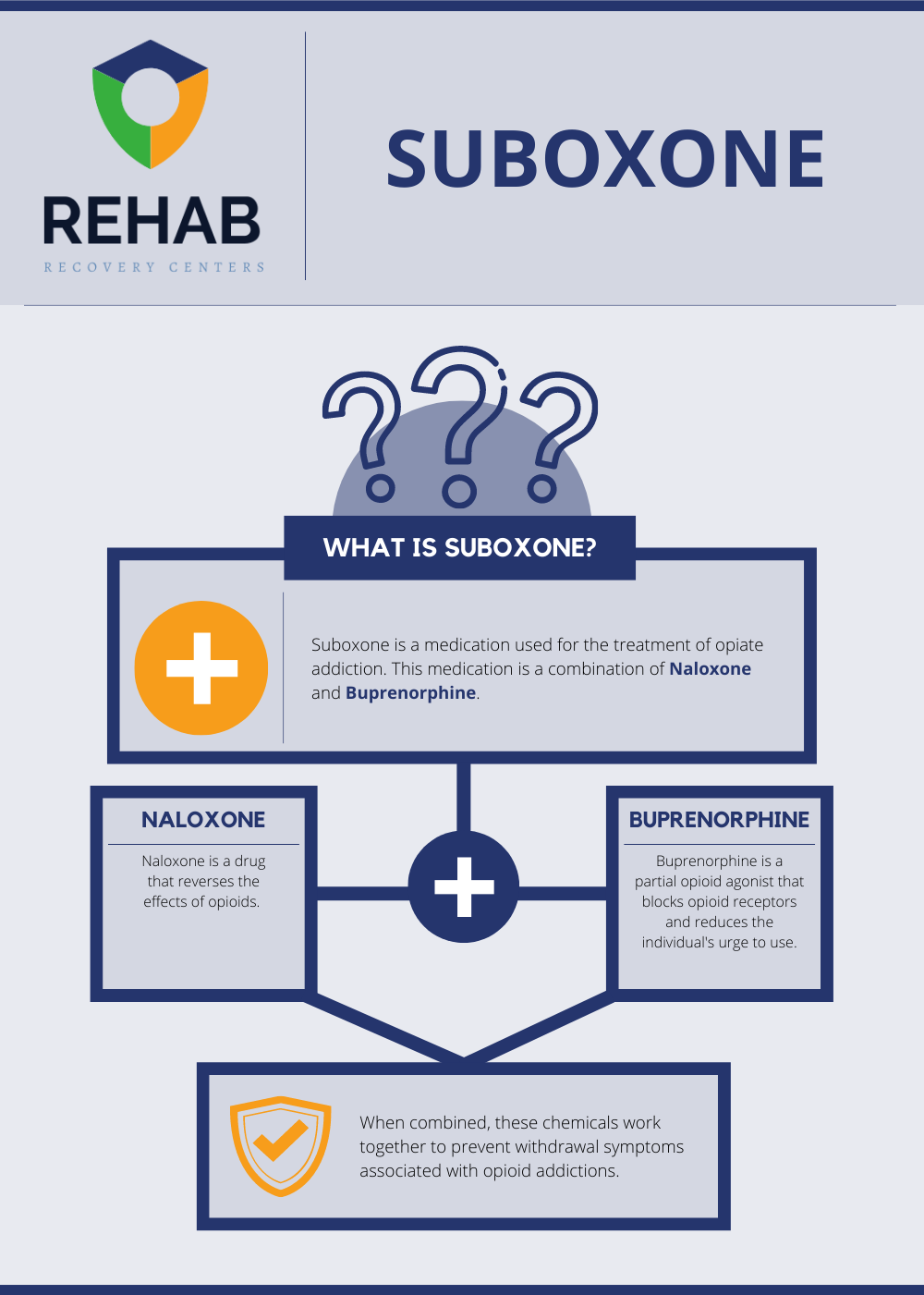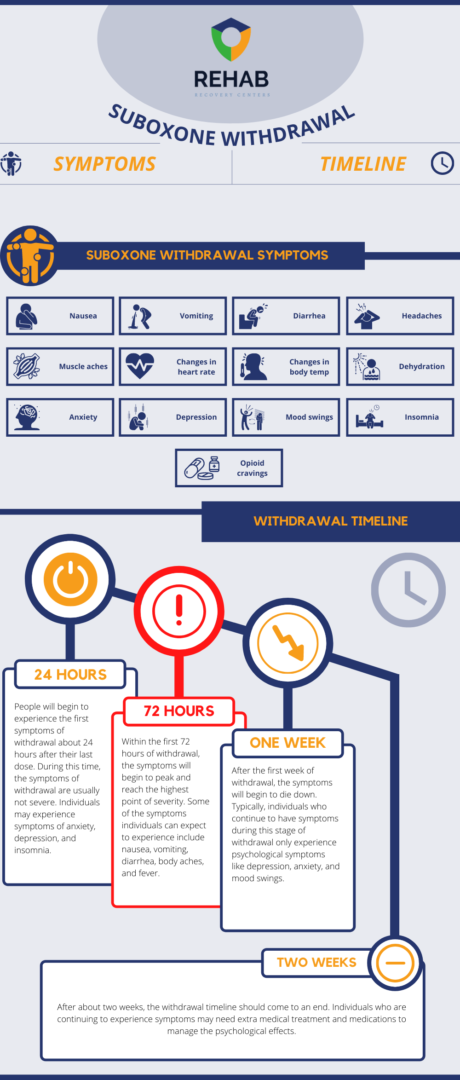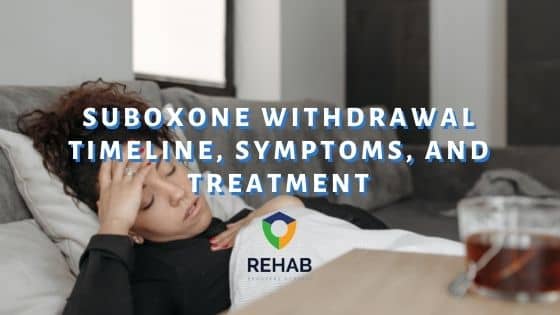Table of Contents
Suboxone is a medication that contains buprenorphine and naloxone. It is used to treat opioid dependency by preventing patients from experiencing severe withdrawal symptoms and cravings.[1]
While the medication can help people recover from opioid addiction, it is still a partial opioid agonist. Because of this, some individuals become dependent on the medication after taking it long-term.
Unfortunately, the Suboxone withdrawal timeline can be extremely uncomfortable and potentially dangerous. This is why doctors gradually taper patients off of their medication if they are taking it as part of an opioid addiction recovery program. Individuals suffering from Suboxone dependency must attend a medical detox center rather than attempting to detox at home.

What are the Symptoms of Suboxone Withdrawal?
Suboxone is a schedule III substance, meaning long-term use of this medication can lead to dependency. When an individual is dependent on a drug, their body becomes accustomed to the presence of the substance in their system. Individuals who stop using Suboxone suddenly will experience symptoms of withdrawal.

The common symptoms of Suboxone withdrawal include:[2]
- Nausea and vomiting
- Diarrhea
- Headaches
- Muscle aches
- Abnormalities in heart rate
- Sudden changes in body temperature
- Dehydration
- Anxiety
- Depression
- Mood swings
- Insomnia
- Cravings for opioids
Depending on how long and how high of a dosage an individual was taking Suboxone, the length and severity of their withdrawal symptoms will vary.
The Suboxone Withdrawal Timeline
While the length of withdrawal depends on a variety of factors, there is a general timeline for individuals to be aware of. People taking Suboxone can avoid withdrawal by being medically tapered off of the substance. However, if an individual quits cold turkey, the symptoms of withdrawal will appear faster and more severe.
An estimated Suboxone withdrawal timeline is as follows:
24 Hours
People will begin to experience the first symptoms of withdrawal about 24 hours after their last dose. During this time, the symptoms of withdrawal are usually not severe. Individuals may experience symptoms of anxiety, depression, and insomnia.
72 Hours
Within the first 72 hours of withdrawal, the symptoms will begin to peak and reach the highest point of severity. Some of the symptoms individuals can expect to experience include nausea, vomiting, diarrhea, body aches, and fever.
Because of the risks of dehydration and increased body temperatures, individuals need to have access to medical treatment during this stage of Suboxone withdrawal.
One Week
After the first week of withdrawal, the symptoms will begin to die down. Typically, individuals who continue to have symptoms during this stage of withdrawal only experience psychological symptoms like depression, anxiety, and mood swings.
Medical detox programs will provide patients with medications to manage any symptoms of depression, anxiety, insomnia, or mood changes.
Two Weeks
After about two weeks, the withdrawal timeline should come to an end. Individuals who are continuing to experience symptoms may need extra medical treatment and medications to manage the psychological effects.
What to Expect During Suboxone Detox
Suboxone detox programs focus on treating the patient’s withdrawal symptoms and ensuring their safety throughout the entire process. Thankfully, the symptoms of opioid withdrawal are not usually life-threatening. However, because Suboxone withdrawal has the potential to cause significant psychological effects and side effects like dehydration, people need to attend a professional detox program.
Suboxone detox programs will provide individuals with the following services:
- An in-depth assessment of their drug abuse history, medical history, and psychiatric history
- 24/7 monitoring of vitals and overall medical safety
- Constant supervision and access to psychological support
- Medications to soothe physical and psychological symptoms
- Access to fluids and electrolytes as needed
- Daily support groups and sober activities
- References to additional addiction treatment programs
Are there Alternative Medications to Suboxone for Opioid Dependency Treatment?
There are other medications available to treat opioid dependency aside from Suboxone. These include methadone, buprenorphine, and naloxone. However, these medications can still cause dependency when abused.[3]
Medication-assisted treatment (MAT) is the type of opioid addiction treatment that includes the use of medications like Suboxone or methadone. It is important to remember that MAT is still considered to be the most effective form of treatment for opioid dependency.
The issue with medications like Suboxone or methadone arises when individuals are not following an intensive MAT program. These medications should only be taken under the direction of a professional MAT program and in combination with behavioral therapies, support groups, and holistic treatments. When individuals do not follow a MAT program, they become more likely to develop a dependency on their medication.
Get Connected With a Top-Rated Addiction Treatment Program
If you or your loved one suffer from an addiction to Suboxone or any other form of an addictive drug, attending an addiction treatment program is the only way to ensure long-term success.
While finding a quality rehab program to attend can be difficult, Rehab Recovery Centers is here to make this process easier for you and your family. Our addiction treatment experts can match you or your loved one with a program that best suits your needs. Contact us today for more information on how to get started.
References:
- https://www.nami.org/About-Mental-Illness/Treatments/Mental-Health-Medications/Types-of-Medication/Buprenorphine/Buprenorphine-Naloxone-(Suboxone)
- https://www.ncbi.nlm.nih.gov/books/NBK526012/
- https://nida.nih.gov/drug-topics/trends-statistics/infographics/medications-opioid-overdose-withdrawal-addiction
Get Help Today
Don’t go through the process of recovery alone. There are people who can help you with the struggle you’re facing. Get in touch with one today.


